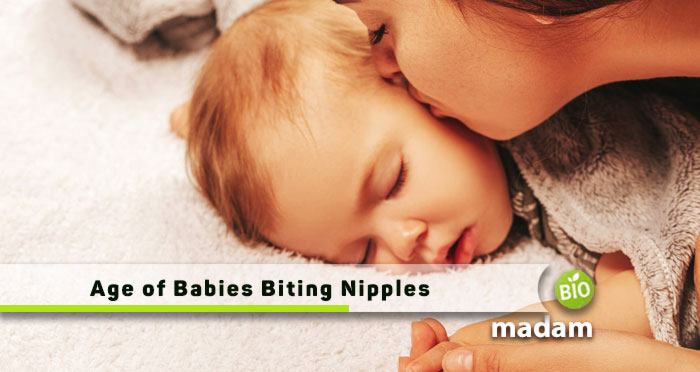Ah, the incredible journey of parenthood – a whirlwind of first smiles, giggles, and those heart-melting baby steps. Just when you thought you were starting to get the hang of things, there’s a surprising plot twist waiting around the corner: the world of nipple biting. Yep, you read that right! Those tiny, toothless wonders eventually venture into the realm of nibbling on, well, everything they can get their hands (or gums) on.
But hold on a second – when does this nibbling extravaganza actually kick-off? Buckle up as we dive into the fascinating world of when babies start biting nipples. It’s a story of teething, exploration, and a dash of baby curiosity that will leave you both amazed and perhaps a tad bemused.
Early Sensory and Oral Motor Development
In the early stages of life, infants embark on a journey of sensory exploration. Through touch, taste, and sight, they begin to make sense of the world around them. This exploration extends to their mouths, where oral motor skills, such as sucking and mouthing, play a crucial role in their development. Babies learn through sensory experiences, and mouthing objects, including nipples, is a natural part of this process.
The Typical Teething Timeline
Teething is a significant developmental milestone that usually begins around the sixth month of a baby’s life. As new teeth begin to emerge, babies often experience discomfort and irritability. Signs of teething can include increased drooling, swollen gums, and a strong urge to chew on objects. This period coincides with the emergence of nipple biting behavior in some babies. The pressure from biting might help alleviate gum discomfort, making it a coping mechanism during this phase.
When Nipple Biting Might Begin
The timing of when babies start biting nipples can vary widely from one infant to another. Some may exhibit this behavior earlier, while others may begin later. Several factors influence the onset of nipple biting, including the progression of teething, individual tendencies toward oral exploration, and differences in sensory development. Babies with heightened oral sensitivity might engage in nipple biting as a way to better understand their surroundings.
Is Baby Biting Normal?

A common concern for parents is whether their baby’s biting behavior is normal. It’s essential to understand that nipple biting in infants is a common developmental phase. Babies’ mouths are a key tool for them to learn about the world, and biting is an extension of this exploration. Biting can also be a precursor to the development of bite inhibition, a skill that helps prevent aggressive biting in the future.
Reasons Behind Nipple Biting
Nipple biting in babies serves multiple purposes, each of which aligns with their developmental needs. Firstly, it’s important to recognize that babies explore the world through their mouths. Biting provides them with a tactile experience that contributes to their understanding of different textures and sensations. Secondly, teething discomfort prompts babies to bite to relieve pressure on their gums. Thirdly, babies might engage in biting as a means of testing reactions and seeking attention from caregivers. Lastly, as babies transition to solid foods, they explore their biting reflexes while adapting to changes in their diet.
Is it Normal for an 8-Month-Old to Bite?
At around 8 months of age, babies are often on the cusp of multiple developmental milestones. They might be actively teething, further motivating them to bite on various objects, including nipples. This behavior is part of their natural progression in oral exploration and sensory development. Therefore, it is indeed normal for an 8-month-old to bite, particularly if they are in the midst of teething.
Strategies for Parents and Caregivers
Navigating the realm of nipple biting requires a thoughtful approach. Equip yourself with these strategies to handle this phase effectively:

- Understand the Reasons: Grasp that babies explore through their mouths, and teething discomfort might drive their biting behavior.
- Recognize Teething Signs: Excessive drooling, swollen gums, and fussiness indicate teething readiness for nibbling.
- Offer Teething Toys: Provide safe teething toys to satisfy their biting urge and soothe their gums.
- Gently Redirect: When they bite, gently shift their attention to teething toys, teaching them appropriate biting targets.
- Foster a Supportive Environment: Create a patient and understanding atmosphere that encourages positive exploration.
- Teach Bite Inhibition: Introduce “gentle biting” concepts to help them control their biting pressure.
Conclusion
Babies’ journey through nipple biting behavior is a fascinating exploration of their development. By understanding the connection between teething, oral exploration, and the emergence of biting, caregivers can embrace this phase with patience and knowledge. Remember that every baby is unique, and this behavior is an integral part of their growth as they navigate their world through their curious mouths.

People call me Domonique Smith in Ross! I was always fond of helping people, so opted an MBBS degree to pursue my passion as my career. My major interests fall in dealing with pregnant ladies and helping them in the best of my wills for their comfort. I am further planning to choose Gynecology as my major, so wish me luck!

